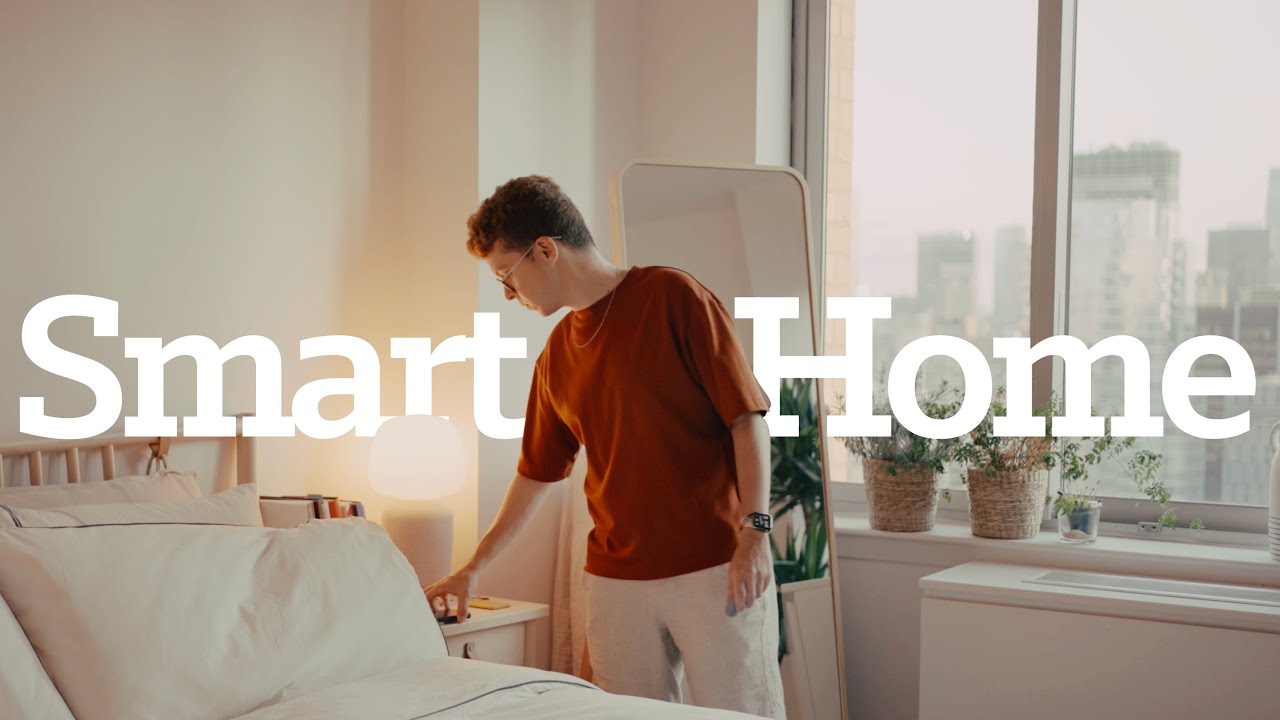Introduction
The concept of smart homes has become more than just a trend—it is transforming the way we live. As technology advances, integrating smart devices into our homes has become easier and more affordable, providing us with a level of convenience and control like never before. From controlling lighting and temperature to enhancing home security, smart homes are making everyday tasks simpler and more efficient.
In this article, we will explore the benefits of smart homes, how technology is integrated into everyday living, and the key devices that can enhance your lifestyle in 2025. Whether you’re looking to improve comfort, security, or energy efficiency, a smart home can offer a range of solutions to meet your needs.
What is a Smart Home?

A smart home refers to a residence equipped with devices and systems that are connected to the internet and can be controlled remotely. These devices can be managed through smartphones, tablets, or voice-controlled assistants such as Amazon’s Alexa, Google Assistant, or Apple’s Siri. The goal of a smart home is to automate and optimize daily tasks for greater convenience, security, and energy efficiency.
With the integration of smart devices, your home can adjust automatically to your needs. For example, lights can turn on when you enter a room, thermostats can adjust based on your preferences, and security cameras can send alerts to your phone. In 2025, smart homes are expected to become even more intelligent, with advanced features such as AI-powered automation and improved connectivity.
Benefits of a Smart Home

1. Convenience and Comfort
One of the main advantages of having a smart home is the convenience it offers. With just a few taps on your phone or voice commands, you can control various aspects of your home. For instance, you can adjust the thermostat to the perfect temperature before you arrive home or turn off the lights without getting up from the couch.
Automating daily tasks such as adjusting your lighting, managing appliances, and controlling entertainment systems adds an extra layer of comfort and ease to your life. Smart devices can also help with time management by reminding you of tasks like taking medications or watering the plants.
Tip: Set up automatic routines for your lights and thermostat to match your schedule, ensuring your home is always comfortable when you need it.
2. Energy Efficiency and Cost Savings
Smart homes are also incredibly energy-efficient. With devices like smart thermostats and smart lighting, you can monitor and control energy usage in real-time, which leads to significant savings on utility bills.
For example, a smart thermostat can learn your habits and adjust the temperature based on your preferences, so you’re not wasting energy when you’re not home. Smart lighting systems can automatically turn off when you leave a room, reducing unnecessary electricity usage.
In 2025, as smart home technology evolves, we expect even more innovations that can help us save energy. From solar-powered smart devices to advanced AI systems that optimize energy consumption, smart homes will continue to improve efficiency and reduce waste.
Tip: Consider integrating a smart thermostat to regulate heating and cooling efficiently, and use smart bulbs to reduce energy consumption.
3. Enhanced Security and Safety
Smart home security systems have become increasingly advanced, offering more robust protection for your home. Smart cameras, motion detectors, and smart locks allow you to monitor and control your home security remotely. Many smart security systems provide real-time alerts, so you can stay informed about any unusual activity around your home.
For example, smart doorbells with cameras allow you to see and speak to visitors from anywhere, adding an extra layer of safety. Smart locks ensure that you can lock or unlock your doors remotely, reducing the risk of forgetting to secure your home. Some systems even send alerts if someone is trying to tamper with a door or window.
In 2025, security systems will become even more sophisticated, incorporating AI-powered analytics to predict potential threats and take action before they occur.
Tip: Install smart cameras and motion detectors to monitor your home while you’re away. Integrate smart locks to ensure your home is secure at all times.
4. Seamless Integration and Control
Another advantage of smart homes is how well the devices integrate with each other. With a centralized control system, you can manage all of your devices from one platform. Whether you use a smartphone app or a voice assistant, you can seamlessly control lighting, appliances, entertainment systems, and security.
For example, with smart home hubs, you can create custom routines that trigger multiple actions at once. You can set the system to dim the lights, adjust the thermostat, and start playing your favorite music as soon as you get home. These integrations not only enhance convenience but also streamline your lifestyle, making everyday tasks much easier.
Tip: Explore creating scenes or routines in your smart home hub to automate multiple actions at once, like setting the perfect movie night atmosphere.
Top Smart Devices for Your Home in 2025

1. Smart Thermostats
Smart thermostats are one of the most popular and energy-efficient smart home devices. They allow you to control the temperature of your home remotely, helping you save energy by adjusting the temperature when you’re away. Devices like the Nest Learning Thermostat and Ecobee SmartThermostat learn your preferences over time and automatically adjust to maintain a comfortable home environment.
In 2025, we can expect smart thermostats to become even more intuitive, integrating with AI to anticipate your needs and improve energy efficiency.
2. Smart Lighting Systems
Smart lighting allows you to control the lighting in your home remotely, using either a smartphone app or voice commands. Tech Bulbs like Philips Hue and LIFX offer customizable colors, brightness, and schedules, allowing you to set the perfect ambiance for any occasion.
In 2025, smart lighting will evolve to include more advanced features, such as color-changing lights that adapt to your mood or time of day, and improved energy-saving functions.
3. Smart Security Systems
A smart security system typically includes cameras, motion detectors, door/window sensors, and a control hub. With these systems, you can monitor your home in real-time from anywhere, receive alerts when something unusual happens, and even control locks remotely.
Top smart security devices include Ring Video Doorbell, Nest Cam, and SimpliSafe. In 2025, expect these systems to incorporate more advanced AI-driven security features, such as facial recognition and predictive threat analysis.
4. Smart Speakers and Assistants
Smart speakers like Amazon Echo, Google Nest Audio, and Apple HomePod have become household staples, offering hands-free control over your smart home. These speakers allow you to play music, control smart devices, set reminders, and get information, all through voice commands.
In 2025, we can expect smart speakers to become even more integrated into daily life, acting as personal assistants that help manage tasks, schedules, and even health data.
5. Smart Plugs and Appliances
Smart plugs and appliances can help make ordinary devices smarter. With a smart plug, you can control any appliance plugged into it remotely. Whether it’s turning off your coffee machine or controlling your lamps, smart plugs add a layer of automation to everyday devices.
In 2025, we can expect smart home appliances like refrigerators, washing machines, and ovens to become even more efficient, with features such as remote diagnostics and AI-driven settings for better performance and energy use.
The Future of Smart Homes

The future of smart homes looks very promising, with continuous advancements in technology paving the way for even smarter and more integrated systems. In the coming years, we can expect smart homes to become more intuitive, with devices that can learn your habits and anticipate your needs. For example, your home could adjust the lighting, temperature, and even music based on the time of day and your activities. Integration with artificial intelligence (AI) will make these homes even more efficient and responsive, providing a truly personalized experience. Additionally, as the Internet of Things (IoT) continues to expand, even more devices will be able to communicate with each other, creating a more connected and seamless living environment. In the future, smart homes will be an essential part of modern life, making our homes more comfortable, secure, and energy-efficient.
Comparative Table: Popular Smart Devices in 2025
| Device | Key Features | Best For | Top Brands |
|---|---|---|---|
| Smart Thermostats | Remote control, energy-saving features | Home temperature control | Nest, Ecobee |
| Smart Lighting | Customizable colors, remote control | Home lighting customization | Philips Hue, LIFX |
| Smart Security Systems | Cameras, motion sensors, remote access | Home security and surveillance | Ring, Nest, SimpliSafe |
| Smart Speakers | Voice assistant, home automation | Hands-free control, entertainment | Amazon Echo, Google Nest, Apple HomePod |
| Smart Plugs | Remote control, energy monitoring | Automating everyday appliances | TP-Link, Kasa |
Conclusion
The rise of smart homes in 2025 offers unprecedented convenience, efficiency, and security. By integrating smart devices such as thermostats, lighting systems, and security cameras, you can enhance your lifestyle, save energy, and stay connected. As technology continues to advance, smart homes will become even more intelligent, providing a more seamless and automated living experience.
Whether you’re looking to improve comfort, increase security, or reduce energy costs, smart homes have something to offer for everyone. Start exploring the benefits of smart home technology today and embrace the future of living.
Call to Action
Ready to transform your home into a smart home? Explore the best smart devices of 2025 and start enjoying a more convenient and efficient lifestyle today. Visit our website for product recommendations and setup tips!




